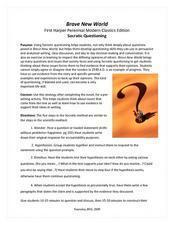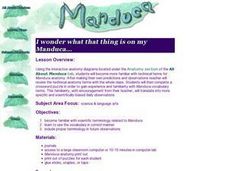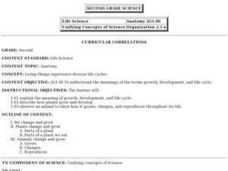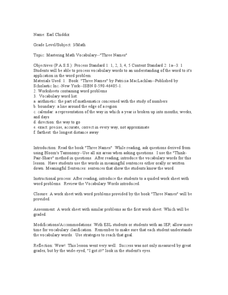Curated OER
Classifying Shells
Students observe and classify different types of shells. They compare and contrast an exhibit they created with one that already exists in a musuem. They discover the different characteristics of shells.
Curated OER
Animal Coverings
Students compare and contrast the types of coverings found on animals. They identify a wide variety of animals in a museum room. They classify animals based on their coverings as well.
Curated OER
Earth Day
Pupils explain that there are pollutants in the Anacostia River, what those pollutants can cause, and how to prevent further pollution. They read about pollution and graph levels of fecal coliform in the water.
Curated OER
Socratic Questioning
If you are new to the technique of Socratic questioning, check out this resource that details the five steps in the Socratic method. The examples of each step are drawn from Brave New World.
Curated OER
Color Mixing
Students experiment with primary colored water to mix new colors. They record new colors on a simple data sheet and share opinions on their work.
Curated OER
Bubble-ology
Students observe the visible spectrum while observing light hitting the surface of bubbles. They blow large bubbles and observe how the colors change.
Curated OER
Choose Your Own Adventure: School Nutritional Policy
Mature audiences are required for this lesson on implementing health-related policies. First, they openly explore the CDC obesity page while taking notes about what they discover. Then they view a PowerPoint about the success of public...
Curated OER
I Wonder What That Thing Is On My Manduca
Students use the internet to gather more information on the anatomy of the Manduca. They make predictions of what the insect will look like when it hatches and complete a crossword puzzle to practice their vocabulary. They continue to...
Curated OER
Village Research
Sixth graders research global warming. In this science lesson, 6th graders collect data in the Waterton Townsite, Apgar Village and St. Mary area. Students interpret the data and form a hypothesis about global warming.
Curated OER
The Process of Art Criticism
High schoolers interpret possible meanings of works of art by analyzing how specific works are created and how they relate to historical and cultural contexts
Curated OER
Who Done It?
Pick and choose which activities to include in this crime scene investigation. Junior detectives can examine fingerprints, DNA, blood samples, or bone structure. The plan suggests you have teams solve a mystery, but it does not give you...
Curated OER
Eyewitness Accounts
Students use eyewitness accounts to gather and evaluate information about the events of the May 18, 1980, eruption of Mount St. Helens. They play the following roles: reporter(s), eyewitnesses, and scientists who are investigating the...
Curated OER
Jazz's Beginnings
Young scholars examine jazz's roots and their hybridization in New Orleans in the early 20th century. They listen to ragtime and jazz recordings, then complete worksheets imbedded in this plan.
Curated OER
Jack London's The Call of the Wild: "Nature Faker"?
Students examine how Jack London tells a story from the point of view of an animal. They read and discuss primary source documents, analyze text and excerpts, complete a chart, and explore various websites.
Curated OER
Earth Egg
Students discuss plate tectonics and the layers of the earth's interior. They use eggs as models of the earth and answer questions regarding which part of the egg would represent which part of the earth.
Curated OER
Are You One of Us?
Students compare and contrast insects and arthropods, identifying characteristics of each. In groups, they sort pictures of arthropods into the five different classes of arthropods. They also sort pictures into insect and non-insect piles.
Curated OER
Antibiotics: Will They Work?
Students examine why antibiotics are important in everyday life. They examine the decisions that people make and how these decisions can artificially speed up natural selection in bacteria that cause infections such as group A...
Curated OER
Living Things Experience Diverse Life Cycles
Second graders will study and explain the meaning of growth, development, and life cycle. They describe how plants grow and develop and observe an animal to show how it grows, changes, and reproduces throughout its life.
Curated OER
Forces and Motion
Fourth graders study straight line motion and the forces that affect motion, including the terms force, gravity, and speed. They determine that gravity, weight, and other forces have an effect on speed and motion.
Curated OER
Lesson 3: Measuring Angles
Students use a protractor to measure angles. They classify angles by type: right angle, acute angles, and obtuse angles. Students build and draw right, acute, and obtuse angles. They discuss how do people in various professions use...
Curated OER
We've Come a Long Way, Baby!
Middle schoolers study technology and the different reproductive technologies available today. In this human reproductive technology lesson students describe how engineers create technologies to improve the health of mothers and babies.
Curated OER
MAISA and the REMC Association of Michigan
Students complete online research to study geography's impact on weather. In this geography and weather lesson, students research weather in their city for ten days using an online website. Students bookmark the site, enter data into a...
Curated OER
Mastering Math Vocabulary- The Three Bears
Integrate reading and math to increase your class' vocabulary. Read The Three Bears by Paul Galdone. Then have your third graders complete a worksheet containing math problems related to the story.
Curated OER
three Names Lesson
After the book Three Names is read aloud, math vocabulary is introduced . Either alone or in groups, learners use the vocabulary words in a meaningful sentence. Then they complete the provided worksheet.





